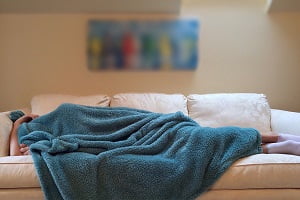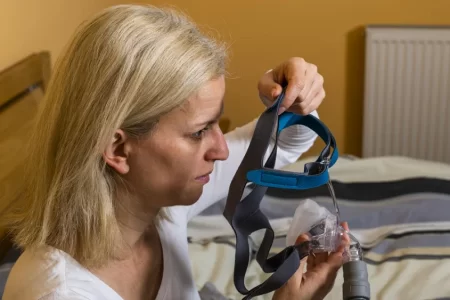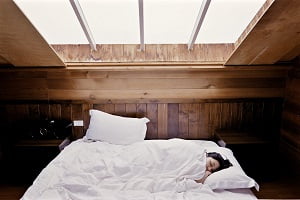Screening and Prevention for Sleep Apnea
- Updated on: Jul 6, 2024
- 4 min Read
By
- Published on Apr 2, 2020

Sleep Apnea
Sleep apnea is a condition in which a person takes pauses in breath while sleeping due to blocked airways limiting the airflow to the lungs, brain, and the body. The brain and the entire body become air deprived which causes the body to wake up in order to breathe.
Symptoms of sleep apnea includes loud snoring, morning headache, excessive daytime sleepiness, awakening with a dry mouth and difficulty in paying attention.
Screening for Sleep Apnea
Your doctor can do sleep apnea screening based on your signs and symptoms and a sleep history, which you can note down with the help of someone who shares your bed or your household, if possible.
The doctor can refer you to a sleep disorder center if needed. A sleep specialist will help you determine if you need further evaluation or not.
Screening for sleep apnea often involves overnight monitoring at a sleep center of breathing and other body functions during the sleep. Home sleep testing is also an option for sleep apnea diagnosis. The tests that detect sleep apnea include:
Nocturnal polysomnography
In this test, equipment monitors your heart, lungs breathing patterns, brain activity, arm and leg movements, and blood oxygen levels while you are asleep.
Home sleep tests
Home sleep tests are the simplified version of an in-lab test. Your doctor might prescribe you a portable breathing monitor kit to be used at home to diagnose sleep apnea.
On the night when the test is to be done, you can follow your regular bedtime routine and pay proper attention to the instructions provided with the kit to ensure you correctly attach the monitoring sensor.
This test usually measures heart rate, blood oxygen levels, airflow, and breathing patterns.
If the results are not normal, your doctor might prescribe a therapy without further testing. Usually, portable monitoring devices don’t detect all cases of sleep apnea and doctors might still recommend polysomnography even if your initial results are normal.
Relieving the Symptoms: Can Sleep Apnea be Prevented?
While there is no method to prevent sleep apnea as such, there are many lifestyle choices that can prevent the condition from worsening and help you relieve the symptoms.
Weight Management
Doctors generally recommend patients with sleep apnea to lose weight, if they are obese.
Obesity, usually in the upper body, may increase the risk of airway obstruction and narrow nasal passages. An obstruction in airway passage can cause you to stop breathing suddenly or for a period of time while sleeping.
Maintaining the body weight can keep the airways clear and somehow reduce sleep apnea symptoms. Research has showed that weight reduction in people with obesity can reduce or eliminate the need for surgery or long-term CPAP therapy.
Physical Exercises
Physical exercises like jogging, walking, body stretching exercises etc can increase your energy level, strengthen your heart, and reduce sleep apnea. Yoga can specifically improve your respiratory strength, blood circulation and encourage oxygen flow.
Sleep apnea is related to a decreased oxygen level in your blood. Exercises can help in improving your oxygen levels through its various breathing exercises. As a result, it decreases the amount of sleep disturbances that you may experience.
Altering Sleep Position
Altering your sleep position can reduce sleep apnea symptoms and improve your night sleep. Studies have found that more than half of obstructive sleep apnea cases have sleep position as a contributing reason.
Sleeping on your back which is called supine position can increase sleep apnea symptoms. For some people, sleeping on the side can help breathing return to normal.
Children with sleep apnea usually sleep better on their backs. You must discuss body positioning and your sleep apnea symptoms with your doctor to evaluate best choice for treatment.
Use of a humidifier
Devices that can add moisture to the air are called humidifiers. Dry air can harm the respiratory system and make it difficult to breathe. Humidifier can open airways, decrease congestion, and encourage easy breathing.
To add more benefits, you can consider adding lavender, eucalyptus and peppermint oil to a humidifier. All these essential oils have anti-inflammatory and soothing benefits.
Clean your humidifier and follow manufacturer’s advice because humidifiers can harbor fungus and bacteria.
Avoid alcohol and smoking
Maintaining a healthy lifestyle can improve your health and encourage better sleeping habits. Avoiding alcohol and quitting smoking can help in reducing sleep apnea complications.
Alcohol usually relaxes the throat muscles that control breathing and can cause snoring and an interrupted sleep cycle. It may also cause inflammation in your airways, blocking your airflow.
Tobacco use can also contribute to the inflammation and swelling in your airways. This can worsen snoring and sleep apnea.
Use of oral appliances
Oral appliances can help in reducing sleep apnea by repositioning your jaw or tongue to keep your airway open while you are sleep.
Healthy diet
Consuming nutritious foods like green vegetables, milk, protein diet etc can help prevent sleep apnea.
FAQs
Who Should be Screened for Sleep Apnea?
The risk factors linked with sleep apnea include sex, age (40 to 70 years are at high risk), postmenopausal status, higher body mass index, and craniofacial and upper airway abnormalities. People who snores loudly and suffers from morning headache, excessive daytime sleepiness, awakening with a dry mouth, should get themselves tested.
Can I use Oxygen Instead of CPAP?
Yes, oxygen can be used instead of CPAP. Oxygen administration is preferred to be an alternative treatment in patients with sleep apnea who do not adhere to continuous positive airway pressure (CPAP) in order to decrease the deleterious effects of intermittent hypoxemia during sleep.
How Common is Obstructive Sleep Apnea?
Obstructive sleep apnea (OSA) is the common form of sleep apnea and affects approximately 4% of men and 2% of women. It is believed that only about 10% of people with OSA need treatment leaving the majority of OSA patients undiagnosed. During obstructive sleep apnea, when throat and tongue muscles are more relaxed, this soft tissue can cause the airway to become blocked.
Does Central Sleep Apnea Cause Brain Damage?
Sleep apnea is a chronic disease which includes repetitive pauses in breathing during sleep. Breathing pauses can prevent your body from supplying enough oxygen to the brain. In severe cases of sleep apnea, this lack of oxygen can lead to brain damage. Signs of sleep apnea include memory problems, difficulty concentrating, and moodiness.












